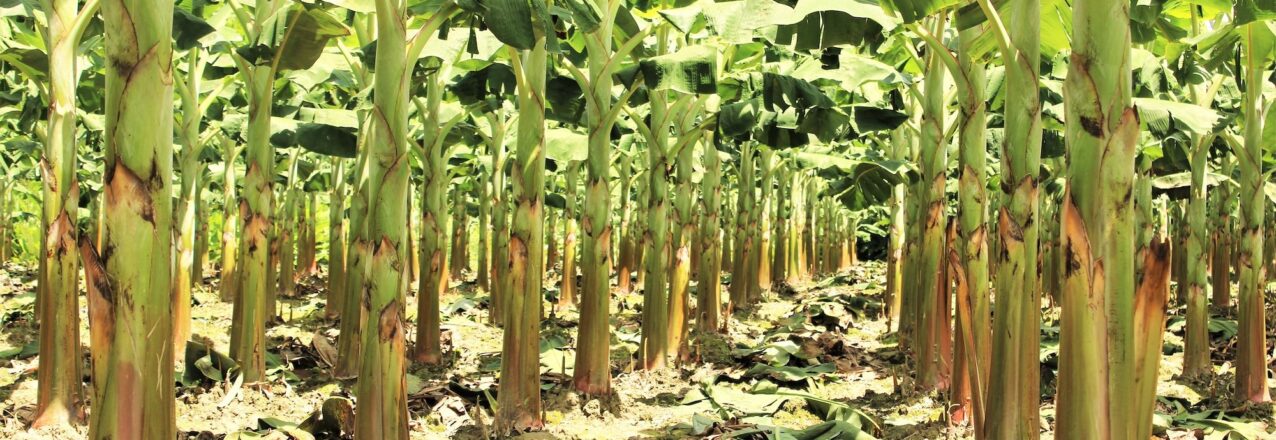With USAID support, plantain farmers in Fuentedeoro obtain secure land tenure and find new business opportunities.
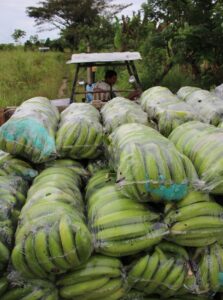 Fuentedeoro is known for plantains. The municipality is located in Colombia’s eastern plains, a vast region of large rivers that drain the Andes into the Amazon basin. In this landscape, Luz Dary Mendoza learned farming from her father, who grew a variety of crops in the fertile plains. But his livelihood and family’s future always depended on the revenue generated from the region’s cash crop: the plantain.
Fuentedeoro is known for plantains. The municipality is located in Colombia’s eastern plains, a vast region of large rivers that drain the Andes into the Amazon basin. In this landscape, Luz Dary Mendoza learned farming from her father, who grew a variety of crops in the fertile plains. But his livelihood and family’s future always depended on the revenue generated from the region’s cash crop: the plantain.
Today, Luz Dary has her own farm in the village of Sardinata Alto, Fuentedeoro, and in 2018, she helped create AGROSARDI, an association consisting of 40 farmers who grow plantain on 40 hectares of land. Like all plantain farmers in Colombia, Luz Dary and her colleagues are challenged with pest management, an unpredictable and erratic climate, and intermediary buyers who pay low prices. But none of these obstacles are as important as secure land tenure, which has silently stymied progress for years.
In Fuentedeoro, an estimated 6 out of 10 parcels lack a registered land title. In fact, none of the 40 members of AGROSARDI have a property title. In most cases, landowners hold what are known as cartaventas, or notarized letters declaring the many details about the land they purchased. No cartaventa is exactly the same, and they are not legally supported by the government. The pervasive lack of land tenure is a disincentive for women like Luz Dary to invest in their plots and agribusinesses.
“We have never had a title to our farming plots. The only thing we have is the cartaventa, and that doesn’t give us any security,” explains Luz Dary.
Historically, landowners in Colombia are responsible for titling and registering their properties with the state, but due to costs, complicated land laws, and the absence of government services in rural areas, only wealthy landowners end up formalizing their land.
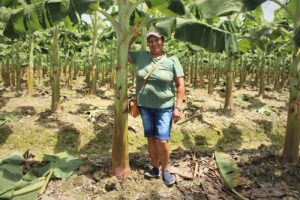 The Rural Property and Land Use Plan, known by its Spanish acronym POSPR, seeks to change this paradigm. The initiative, which surveys and updates the cadaster for every parcel in the municipality, was recently carried out by Colombia’s National Land Agency with USAID support. Land formalization teams surveyed almost 4,500 rural parcels, covering Fuentedeoro’s more than 56,000 hectares. The land administration plan discovered that some 2,000 plots are ready to be formalized. Among these plots are the farms of Luz Dary Mendoza and 19 AGROSARDI members.
The Rural Property and Land Use Plan, known by its Spanish acronym POSPR, seeks to change this paradigm. The initiative, which surveys and updates the cadaster for every parcel in the municipality, was recently carried out by Colombia’s National Land Agency with USAID support. Land formalization teams surveyed almost 4,500 rural parcels, covering Fuentedeoro’s more than 56,000 hectares. The land administration plan discovered that some 2,000 plots are ready to be formalized. Among these plots are the farms of Luz Dary Mendoza and 19 AGROSARDI members.
“Thanks to the parcel sweep and USAID’s initiative to increase land security, we are finally going to own the land, receive a property deed. Many of us will now feel better about investing in other crops such as fruit orchards that will generate even more income,” says Luz Dary.
This year, the National Land Agency will deliver the first batch of 200 rural property titles, thanks to land formalization efforts and USAID investments to strengthen land tenure in Fuentedeoro, Meta. Luz Dary and the members of AGROSARDI will celebrate their land titles, the basis for building a plantain agribusiness.
Building New Partnerships
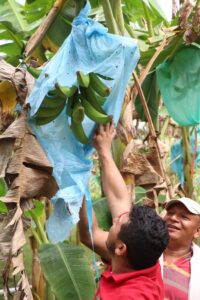 Under Luz Dary’s leadership, AGROSARDI joined a Public-Private Partnership (PPP) focused on plantain agribusiness. The PPP, which was facilitated by USAID Land for Prosperity, is valued at more than USD $250,000 and links critical investments from the public and private sectors to nearly 200 plantain farmers in and around Fuentedeoro.
Under Luz Dary’s leadership, AGROSARDI joined a Public-Private Partnership (PPP) focused on plantain agribusiness. The PPP, which was facilitated by USAID Land for Prosperity, is valued at more than USD $250,000 and links critical investments from the public and private sectors to nearly 200 plantain farmers in and around Fuentedeoro.
Thanks to the PPP and the regional government, AGROSARDI will be able to access tools such as tractors and loading equipment to improve post harvest handling and moving plantains to new market channels. The PPP also has the support of Agrollanos as a commercial ally, which will purchase its plantains for distribution through final products to large food companies such as Pepsico.
The PPP is part of USAID’s comprehensive strategy to mobilize regional actors and the private sector and foster licit economic opportunities in areas where land tenure security is being strengthened. The strategy looks for strategy value chains in regions where USAID is working with the government to survey and formalize informal property in a handful of municipalities. Since 2021, Land for Prosperity has facilitated more than 27 public private partnerships, which have mobilized more than USD $90 million in public funds and investments.
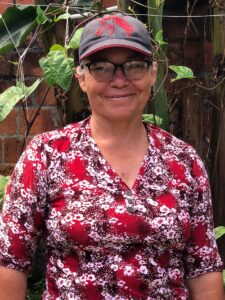 Thanks to the plantain PPP, farmers are learning Good Agricultural Practices (GAP). AGROSARDI will generate cleaner, agrochemical-free crops. GAP also promotes soil recovery through the use of organic fertilizers, resulting in cleaner plantain suitable for human consumption.
Thanks to the plantain PPP, farmers are learning Good Agricultural Practices (GAP). AGROSARDI will generate cleaner, agrochemical-free crops. GAP also promotes soil recovery through the use of organic fertilizers, resulting in cleaner plantain suitable for human consumption.
“I always invite young women to get involved in farming. I know that if they live this experience, they too will fall in love with it and will continue to fight for a stable crop that allows us to support our family.” says Luz Dary Mendoza, plantain farmer, Fuentedeoro.
Cross-posted from USAID Exposure


